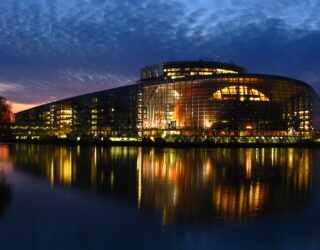New York’s Governor Andrew Cuomo this week signed an executive order forbidding the state from doing business with any organization who has boycotted or divested from Israel. In addition, a blacklist will be put together of all groups involved in “boycott, divestment or sanctions actively targeting Israel, either directly or through a parent or subsidiary” and the entirety of New York’s executive branch agencies will be themselves forced to divest from any of those listed companies. Beyond the twisted McCarthyism of creating blacklists on behalf of foreign states, there is an additional level of hypocrisy in this move that must be examined.
The 2010 Citizens United v. FEC ruling effectively ruled that money equals speech. Monetary expenditures towards political speech are protected against regulation under the First Amendment’s free speech clause. To use the Center For Public Integrity’s synopsis, “in a nutshell, the high court’s 5-4 decision said that it is OK for corporations and labor unions to spend as much as they want to convince people to vote for or against a candidate.”
Citizens United is a ruling that has served Governor Cuomo well, as the most major recipient of dark money in New York gubernatorial history
This ruling does govern expenditures on political campaigns, but where is the line drawn between money spent on campaign expenses and money spent toward political agendas? For example, Monsanto is a corporation with a political agenda, and it has a Political Action Committee (PAC), the Monsanto Citizenship Fund, that uses its money to further that agenda. The Koch Brothers spend millions every year in their PAC to further their agenda of ending environmental regulation, and regulation on business in general. The unlimited fundraising and spending power of these groups, morphing from PACs into SuperPACs, is the result of the Citizens United decision.
Citizens United is a ruling that has served Governor Cuomo well, as the most major recipient of dark money in New York gubernatorial history according to a report by ProPublica, with his 501(c)4, the darkest of dark money, outraising President Obama’s own SuperPAC in 2011. But if money is constitutionally-protected speech, then isn’t banning certain politically-directed economic decisions unconstitutional?
If money equals speech, how is it that David Duke cannot be censured or censored for his hate speech, but those who object to the occupation of Palestine with their wallets get reprimanded? Why can corporations donate to Donald Trump’s campaign or SuperPACs supporting it without penalty, but businesses that choose not to buy Israeli goods can lose their livelihoods?
Cuomo’s actions have the support of Hillary Clinton, herself one of the main beneficiaries of Citizens United
Governor Cuomo has been aggressive in using New York’s incredible state wealth (second only to California’s in terms of total budget) as a penal tool, forbidding state-funded travel to states whose anti-LGBTQ laws he disagreed with, an action lauded by many on the left. But what happens now that he’s wielding it in favor of the occupation of Palestine?
Maybe money as protected speech is simply different on the state level. But if that is in fact so then the concern must nonetheless remain, as New York Senator Chuck Schumer wants to bring this idea to the federal level, and it has as well the support of presumptive Democrat Presidential nominee Hillary Clinton, herself one of the main beneficiaries of the Citizens United ruling (only one candidate, Jeb Bush, has taken in more SuperPAC money than Clinton).
This is not a debate on the merits of the Boycott, Divestment and Sanction movement. Nor is this a debate on antisemitism. Zionism and Judaism are not synonyms: according to a Jewish survivor of the concentration camp Theresienstadt quoted in Hannah Arendt’s Eichmann In Jerusalem: “Zionists, according to the Nazis, were ‘the <decent> Jews since they too thought in <national> terms.’” (p. 60). Antisemites can be Zionists, and Jews can be antizionists. This goes beyond politics to a question of constitutionality: when does money stop being speech?
Governor Cuomo’s Executive Order 157 must be challenged by the BDS movement in court. It must be fought to the highest level, on behalf of every American. If money is speech, then boycotts and economic activity on behalf of a political agenda must be protected speech. If money is not speech, then Citizens United must be reconsidered and political donations regulated. This is our chance to correct one of the fundamental contradictions of our political system, or to have a clear ruling on what kind of a political system America has: can it still be called some form of democracy, or has it descended to blatant, naked plutocracy? We need to know where the line is truly drawn between economic transaction and free speech, and challenging New York’s Executive Order 157 is our chance.
Update: The ACLU announced the day after this article was published that they are pursuing legal action against Executive Order 157 using the 1982 NAACP v. Claiborne Hardware Co. Supreme Court decision that boycotts are a form of petition protected under the freedom of speech as precedent. The question remains whether broadening the case to include Citizens United as precedent as well can bring about greater change for the country and clearer lines for our politics.
Image: Keith Alexander



